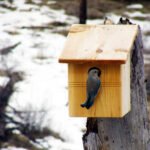
Feeding birds at the park is a common pastime for families looking to enjoy the outdoors and connect with birds. However, for bird lovers in Scottsdale, Ariz., throwing bread crumbs to birds at the park is now a crime, according to The Arizona Republic.
If you are caught feeding geese, ducks or pigeons at public parks, you could be fined up to $750—though real citations will probably be around $50 to $100—and even get some time behind bars.
Before bird lovers out there arm themselves with pitchforks and torches, it’s important to note that this is not always unjustified or done for a hatred of nature.
Here’s more from the Arizona Republic:
Officials say it’s not a question of being killjoys but a serious matter of keeping the parks clean and safe, protecting the birds and saving money by clamping down on a practice that has become a feeding frenzy.
These types of stories have been popping up all over the nation for some time now because feeding birds at parks is not always a great idea. Not only is the bread fairly unhealthy for the birds, but it also increases population and the spread of disease through increased defecation.
According to the article, people are not just throwing a few scraps of food to the birds. They’re leaving massive amounts of food for the birds to feast on. This is not only annoying for park-goers either. Birds are equally affected by this type of buffet feeding of unhealthy food.
Still, there’s something unsettling about being unable to feed the birds at your park, even if you’re giving them corn or bird seed. From the articles, it doesn’t seem like anyone is outraged at this brand new ordinance that took effect Friday.
While excessive fines and jail time are only given in extreme circumstances like one 80-year-old Massachusetts woman who faced a jail sentence for feeding birds despite repeated warnings, banning bird feeding seems extreme.
What do you think? Is this just a sad but necessary regulation to keep parks clean and protect birds, or is it another example of a heavy-handed move of banning something joyful?




7 Comments
I agree with Larry ,education and feeding good food is a much better solution. Also “domestic” or Rock Pigeons are NOT native to America. Maybe we could do some poisoning pigeons in the park. Just kidding, I think Tom Lear or someboby did a very funny satire called “Poisoning Pigeons in the Park” 30 years ago we did not have Starlings in California and now they are everywhere and some of our native birds are less common. For example I have not seen a Band-tailed Pigeon in years. Both Western and Mountain Bluebirds are less common etc. So, having been a teacher for 30 years I am a believer in education. Reducing the amount of food would reduce the “domestic” bird problem but there will always be people feeding the birds in the park. I have been to parks where there are 3 or 4 good educational signs telling people to Not feed the birds and people are still feeding them.
That sounds like a fantastic idea. I wish more cities would go that route instead of simply fining people for wanting to feed the wildlife.
I get the impression that the city fathers were simply tired of complaints and took the easy way out by copying some other statute.
They missed an opportunity to manage the situation. They could have provided vending machines, with authorized seed – and maybe even made a little money on it (for support of parks), and geared sanctions to fit use, or not, of official seed sources.
Of course, the official feed would be purchased from local sellers and most could have been quite happy with that arrangement.
A similar arrangement is in place at a wildlife sanctuary in Green Bay, WI.